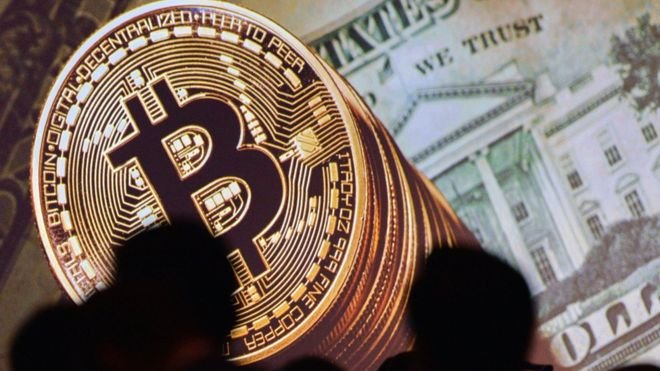( )
)
Bitcoin plunged on Friday, extending a fall that saw the crypto-currency lose almost a third of its value from a record of nearly $20,000 (£15,000).
The crypto-currency's price dipped below $11,000 on Friday, according to the Coindesk exchange website, before recovering to above $13,000.
Amid the swings, three Bitcoin-related exchanges suspended certain trades.
Bitcoin has had a blistering trip over the past 12 months. Its price at the start of the year was about $1,000.
It has skyrocketed since - more than doubling in value since November - drawing interest from major firms as well as private investors.
But since Sunday Bitcoin has been on a losing streak, falling back to where it was at the start of December.
Analysts said investors should be prepared for such rapid changes, which have characterised the asset from its start.
"This is exactly how this asset trades and has done since the beginning," said Nick Colas, co-founder of New York-based DataTrek Research. "It has a lot of volatility and it will for the foreseeable future."
What happened on Friday?
This week's plunge led to a flood of trades that swamped one of Bitcoin's major exchanges, Coinbase, on Friday. A technical slowdown prompted the firm to halt buying and selling twice.
Is Asia driving the Bitcoin craze?
What is Bitcoin?
'Be ready to lose your money'
The CME and CBOE exchanges in the US also temporarily suspended trading of certain Bitcoin futures contracts, which allow investors to bet on where they expect the price of Bitcoin to be at certain points in the future.
The exchanges have automatic brakes that apply once a commodity or asset has moved by a certain amount - as happened in this case.
What sparked the slump?
The market remains driven by sentiment, according to Charles Hayter, founder and chief executive of industry website Cryptocompare.
"A manic upward swing led by the herd will be followed by a downturn as the emotional sentiment changes," he said.
Some traders would have been cashing in on the spectacular gains made over the year, he added.

Concerns about the infrastructure behind crypto-assets may also be spooking investors, said Nick Colas, himself a Bitcoin trader.
In recent weeks, markets have been rattled by hacks and allegations of insider trading.
He attributes some of this week's slump to the launch of a new crypto-asset that came earlier than planned. The surprise temporary shutdown of Coinbase on Friday was the kind of thing that could erode investor confidence, he argued.
"It is not OK to just take trading offline randomly through the day," he said. "The robustness of that system is just as important to their confidence... as the price of crypto-currencies themselves."
A spokesman for Coinbase said the firm was working around the clock to ensure smooth trading. Friday's suspensions lasted for about two hours in total.
"We're doing everything within our power," the spokesman said.
What exactly is Bitcoin?
A digital asset, Bitcoin is not backed by any governments. It is created through a complex process known as "mining", and then monitored by a network of computers across the world.
There is a steady stream of about 3,600 new Bitcoins a day, with more than 16.5 million now in circulation. Supply is expected to peak at about 21 million.
Every single transaction is recorded in a public list called the blockchain.
This makes it possible to trace the history of Bitcoins to stop people from spending coins they do not own, making copies or undoing transactions.
What are authorities saying about Bitcoin?
Regulators around the world have stepped up their warnings about its provenance as an investment.
One of this week's most striking comments came from Denmark's central bank governor, who called it a "deadly" gamble.
Earlier this month, the head of one of the UK's leading financial regulators warned people to be ready to "lose all their money" if they invested in Bitcoin.
Andrew Bailey, head of the Financial Conduct Authority, told the BBC that neither central banks nor the government stood behind the "currency" and therefore it was not a secure investment.
Despite the risk to individuals, US authorities have said they do not think it is a big enough part of financial markets to be a threat to broader economic stability.